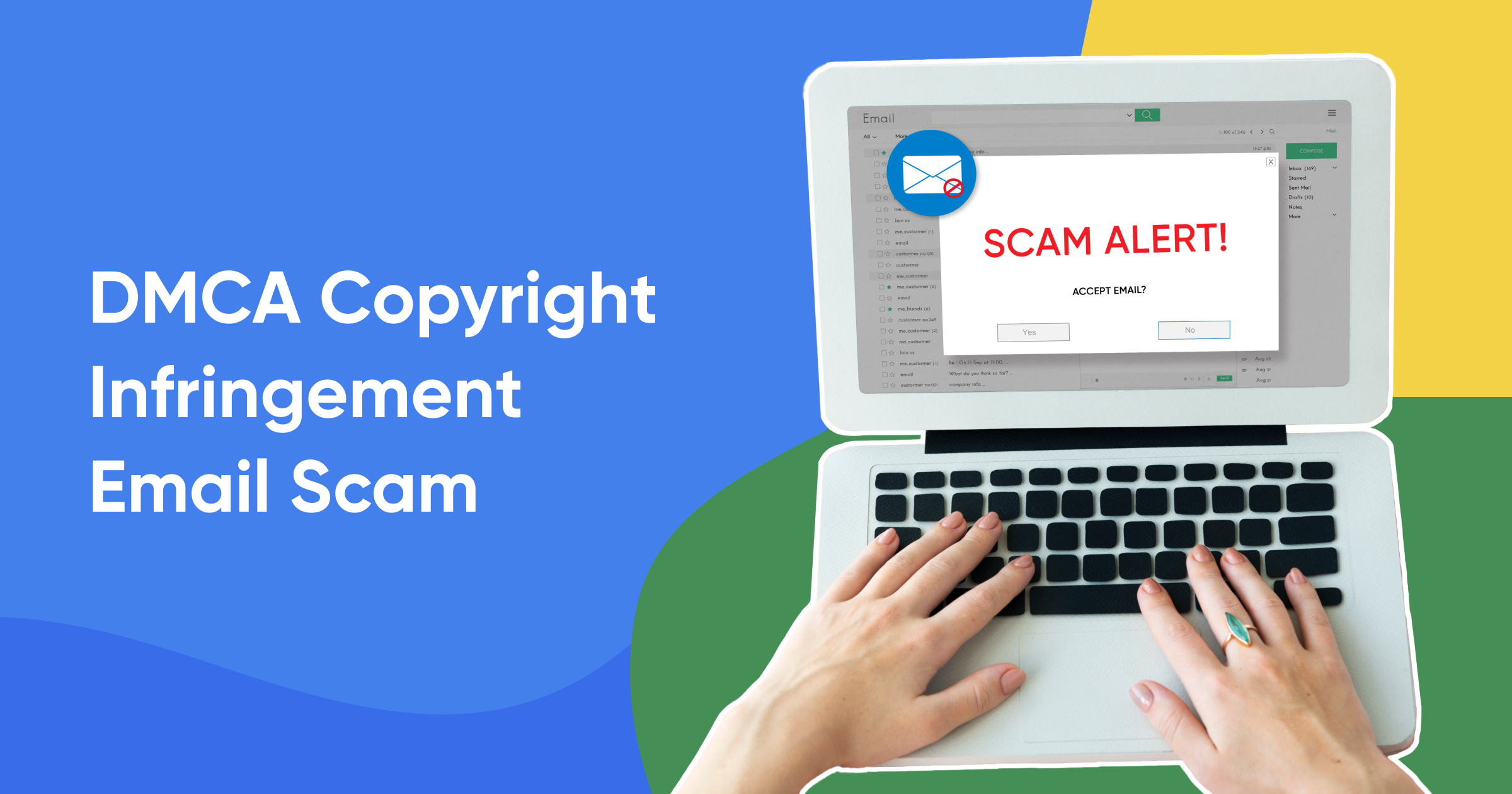Lindokuhle Mkhize
20 November 2023 • 4 min read

Have you ever received an email or form submission claiming that your website violates copyright-protected images? Don't be fooled! This is a phishing scam, where the sender pretends to be a copyright owner and aims to trick you into taking immediate action.
In this article, we’ll examine this scam, understand how it takes advantage of copyright concerns, and provide you with essential tips to stay safe from such deceptive schemes.
Intellectual property infringement occurs when someone uses someone else's creative work without permission. It can include using someone's photos or copyrighted materials without giving credit or using a copyrighted image or music without authorization.
The DMCA (Digital Millennium Copyright Act) copyright infringement notification email virus is a scam targeting individuals or companies.
These fake emails claim that you have violated copyright laws and must take immediate action. The goal is to trick you into clicking on malicious links or providing personal information. Be cautious and avoid falling for such tactics.
Using someone's copyrighted work without permission can have consequences. Resellers of stolen images or infringing materials may have their listings removed or be banned from selling on specific platforms. Bloggers may receive requests to remove images or just credit the copyright owner. In some cases, legal action and fines may be involved.
YouTube creators who use copyrighted images or materials may have their videos demonetized or removed.
To identify phishing emails or messages, watch out for these signs:
1. Poor grammar and spelling:
Scammers often make mistakes in their messages, while legitimate organizations have better communication skills.
2. Urgency and pressure:
Scammers create a sense of urgency, pressuring you to act quickly without thinking it through.
3. Unknown senders:
Be cautious of emails from unknown senders, especially if they claim to represent a well-known organization. Scammers may use fake email addresses or manipulate website images to display names.
4. Requests for personal information:
Authentic organizations rarely ask for sensitive information via email. Be wary of any email that asks for login information, passwords, social security numbers, or credit card details.
5. Suspicious URLs:
Avoid clicking links or downloading images or file attachments from unfamiliar sources. They may contain malware or direct you to fake websites.
If you've clicked on a malicious link, take these steps:
1. Disconnect from the internet:
Immediately disconnect from networks or Wi-Fi to prevent further communication with the malicious source.
2. Scan for malware:
Use reliable antivirus software to scan and remove potential threats from your device. Ensure your security software is up to date.
3. Change passwords:
If you entered any passwords or sensitive information, change them immediately. Consider enabling two-factor authentication for all access for added security.
4. Update your software:
Keep your operating systems, browsers, and software applications updated with the latest security patches to protect against known vulnerabilities.
5. Stay vigilant:
Monitor your device for unusual activity or signs of malware, such as slow performance, unexpected pop-ups, or unfamiliar processes running in the background.
Stay vigilant and trust your instincts regarding suspicious emails or notifications. It's essential to verify their authenticity before taking any action. Protect yourself by remaining cautious, informed, and alert in your online activities. For more information, refer to Brown's Digital Millennium Copyright Act (DMCA) Compliance Policy and its procedural document.
The DMCA notification and takedown process allows copyright holders to have user-uploaded material that violates their copyrights removed from websites.
A copyright infringement notice ("Notice") is meant to tell you that the owner of a copyrighted work believes you have infringed their copyright, such as by unlawfully uploading or downloading music, movies, TV episodes, videos, or games from the internet without their permission.
Report phishing emails to [email protected] as well. These reports are used by the Anti-Phishing Working Group, which comprises ISPs, service providers, security companies, financial institutions, and law enforcement agencies, to combat phishing.
AUTHOR
Lindokuhle Mkhize, a skilled creative copywriter and content lead at Trademarkia, brings a wealth of experience in driving innovation and managing teams. With previous success in starting and growing the Innovation and Marketing department at her former creative agency, Lindokuhle boasts expertise in leadership and delivering compelling content. Based in South Africa, Lindokuhle's work focuses on key themes of creativity, effective communication, and strategic marketing.
Related Blogs

How to Renew a Trademark: A Guide That M...
17 May 2024 • 5 min read

How to Trademark a Name | Exploring the ...
17 May 2024 • 8 min read
.png%3Falt%3Dmedia%26token%3D61e4c1a1-34ee-427f-8cbe-48da50784682&w=256&q=75)
Will Palworld Get Copyrighted? (+ the Po...
17 May 2024 • 5 min read

7 Tips to Protect Your Business from Bra...
17 May 2024 • 8 min read

Can OpenAI Trademark GPT? (It’s Not That...
17 May 2024 • 3 min read